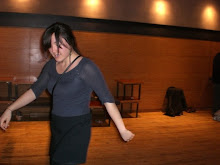"Julie in the Funhouse" from Jenny and the Jaws of Life
I received this collection of short stories along with the strong recommendation and endorsement of a good friend whilst still reading The Unbearable Lightness of Being. One problem I run into as I flit from one book to another is an issue of loyalty. If I read a book or collection that I am particularly enamored of, the next book is often doomed to mediocrity. This happened with Albert Camus' The Stranger recently (I know, right? Who do I think I am?). The result of this is replacing the less-than-enjoyed book back on my list for a later date. This is disappointing because chances are I'll only live into my eighties or so, meaning the odds of my reading every book I ever want to are already pretty slim. Rereading seems like a self-inflicted glitch, however necessary. I say all this only so I can say that this did not happen with Jincy Willett's collection. She follows Milan Kundera well. And so, before I delve into my excited and overly-qualified evaluation of one of her stories, I want to quote what David Sedaris says of her in his foreword. This is what I hope someone says (or thinks) of my writing someday:
Like all the best storywriters, Jincy Willett excels in the moment, that split second when everything changes, and there's a discomfort to this. We like to think we'll recognize such moments in our own lives, but when the time comes we almost always get it wrong. Our eyes peeled for the Big Event, we point out the usual suspects--the death of a parent, the car spinning out of control--not realizing that the damage was done weeks or maybe years earlier, over dinner or while washing our hair, the moment cunning in its very resemblance to everyday life.
GUH. Okay, here we go:
As the opener of the collection, "Julie in the Funhouse" feels like it's told in one breath. As I finished reading, I felt as though I was taking my first breath since I'd begun. She manages, flawlessly and seemingly with ease, to tell a story about a brother and a sister that happens to have a brutal incident in it (rather than the cheap vice versa). And it is not just any sibling relationship--she flirts the line of love that siblings experience without belittling or romanticizing it. She follows well (and, thus, so do we) the change that takes place when people are alive and the sudden realization of that change when one of them dies and the other does not. Her writing is the kind that makes me want to copy down each word in hopes that her style and brilliance will infiltrate and transform (and improve) my own. Alas, post-it notes must do.
What I wish I'd written: "I laugh out loud and apologize at the same time, but Mr. Peterson is eighty-two years old now, and he smiles at me, acknowledging horror and despair with a sweet smile, the way some old people do, and some not so old people who have suffered early." (p. 11)
9 years ago



I read once that Hunter S. Thompson, in his early days, used to transcribe the novels of Fitzgerald and Hemingway and others, start to finish, just so his fingers could know what it felt like to write so beautifully.
ReplyDelete